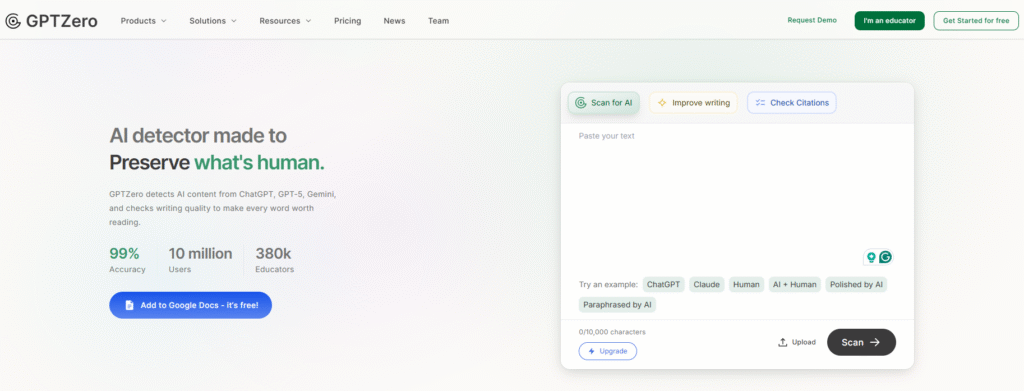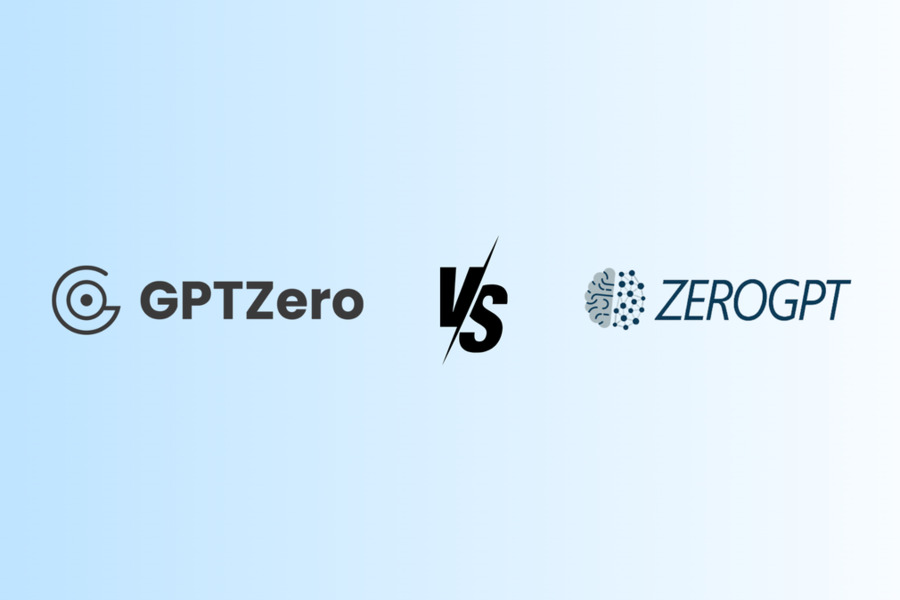Remember when spotting automated content felt straightforward? Those days are long gone. As AI writing tools become increasingly sophisticated, distinguishing human-crafted content from machine-generated text has become a genuine challenge.
This growing dilemma has sparked intense interest in reliable detection solutions, with the ZeroGPT vs GPTZero debate taking center stage. But which platform genuinely meets user expectations, and how do their approaches differ where it matters most?
This comprehensive comparison cuts through the marketing claims to examine what really sets these tools apart. We’ll explore their detection methodologies, accuracy rates, additional features, and pricing structures to help you determine which solution aligns with your specific needs.
What is ZeroGPT?

At its core, ZeroGPT positions itself as the accessible, user-friendly option in the AI detection landscape. The platform operates on a straightforward principle: you paste your text, and within seconds, it delivers a percentage score indicating the likelihood of AI involvement. This simplicity has become its signature feature, appealing to users who prioritize quick results over complex analytics.
The technology powering ZeroGPT centers around its proprietary DeepAnalyse™ system, which scans text for patterns commonly associated with AI generation. The platform offers both free and premium tiers, making it particularly attractive to students and casual users with occasional detection needs. While the company claims impressive accuracy rates approaching 98%, independent testing suggests performance varies significantly with text length and complexity.
What is GPTZero?

GPTZero takes a fundamentally different approach, positioning itself as the precision instrument in AI detection. Rather than providing a simple percentage score, the platform delves into the linguistic characteristics that differentiate human and machine writing. Its analysis focuses on two key metrics: “perplexity” and “burstiness,” which measure textual predictability and sentence variation respectively.
The platform’s methodology reflects its academic origins, having been developed specifically for educational environments where detection accuracy carries significant consequences. Perplexity analysis evaluates how surprising or predictable text appears to an AI model, with highly predictable sequences suggesting automated generation. Burstiness examines sentence structure variation, recognizing that human writers typically employ diverse sentence lengths and patterns compared to AI’s more uniform output.
ZeroGPT vs GPTZero: Key Features
1. AI Detection Accuracy
When it comes to the core function of detecting AI, both tools have their strengths, but their approaches—and results—are worlds apart.
GPTZero uses its “perplexity” and “burstiness” analysis to scrutinize text, and the numbers are impressive. It claims an accuracy of up to 99% for human-written text and 85% for AI-generated text. But here’s the kicker: its false positive rate is a minuscule 1%. This means it’s highly unlikely to flag your masterpiece as AI-generated.
ZeroGPT, on the other hand, claims a remarkable overall accuracy of over 98%. However, its biggest weakness lies in its false positive rate. It has a considerably higher rate, sometimes assigning an average AI probability of 30% to completely human-written content. In some cases, the overall false positive rate can reach as high as 50%.
So, what does this mean in plain English? If you’re a student submitting a term paper or a professional handling sensitive documents, you’ll want the precision of GPTZero. Its in-depth analysis and low false positive rate make it the more reliable choice for serious academic and professional work. ZeroGPT, with its higher false positive rate, is better suited for quick, informal checks. Think of it as a helpful but not always perfectly accurate first line of defense.
2. Plagiarism Checker
Plagiarism is a writer’s worst nightmare, and both ZeroGPT and GPTZero have tools to help you avoid it.
GPTZero’s plagiarism checker is a clear standout. It cross-references your text against a massive database of online sources, providing detailed reports that highlight potential duplicate content. This is a game-changer for anyone in education or research, making it easy to cite sources properly and avoid unintentional plagiarism. Its free plan even gives you five checks per month, making it a great starting point.
ZeroGPT’s plagiarism tool focuses on speed and accessibility. It also scans against billions of online sources, but its key differentiator is its support for over 190 languages. This is a huge advantage for users working with non-English content, ensuring that your work is original no matter where it’s created. While it may not offer the same level of detailed reports as GPTZero, its versatility makes it a powerful option for a global audience.
3. Grammar and Writing Assistance
Beyond detection, both platforms offer features that help you improve your writing.
GPTZero provides a more sophisticated tool that goes beyond basic corrections. It’s like having a seasoned writing coach by your side, offering nuanced feedback on tone and sentence structure. This makes it an ideal tool for users who are serious about refining their writing style and not just fixing typos.
In contrast, ZeroGPT offers a straightforward grammar checker focused on efficiency. It’s designed to catch common, surface-level errors, like confusing “affect” with “effect.” It’s the perfect tool for a quick proofread, especially since it’s easily accessible without a subscription. It won’t teach you to write like a pro, but it will make sure you don’t submit a paper full of embarrassing mistakes.
ZeroGPT vs GPTZero: Pricing Breakdown
ZeroGPT Pricing
ZeroGPT offers a flexible pricing structure that makes it easy for anyone to get started.
- Free Plan ($0/month): Perfect for casual users. You get up to 15,000 characters per detection, 5 batch file checks, and basic access to other tools like summarizers and grammar checks. It’s a great way to test the waters without any commitment.
- Pro Plan ($7.99/month annually, or $9.99/month monthly): This plan is aimed at professionals and regular users. It bumps you up to 100,000 characters per detection, 50 batch file checks, and comprehensive PDF reports. It offers solid value for the price.
- Max Plan ($18.99/month annually, or $26.99/month monthly): The heavy-hitter plan for content creators and large businesses. You get 150,000 characters per detection, 75 batch file checks, and even access to their proprietary ZeroCHAT-5. This is the plan for managing large volumes of work.
GPTZero Pricing
GPTZero’s pricing model is tailored to different user groups, from students to large organizations.
- Essential Plan ($14.99/month): Designed for basic users like students and bloggers. You get up to 150,000 words per month, and access to the Origin Chrome Extension.
- Premium Plan ($23.99/month): Ideal for educators and freelance writers. It includes all Essential features plus a higher limit of 300,000 words per month, plagiarism scanning, and writing feedback. This is where the real value starts to shine.
- Professional Plan ($45.99/month): The top-tier option for organizations and teams. It offers everything in the Premium Plan, but with a massive limit of 500,000 words per month, advanced data security options, and Single Sign-On (SSO) for seamless team management.
Final Words on ZeroGPT vs GPTZero
Both GPTZero and ZeroGPT are powerful tools for AI content detection, but they are built for different purposes.
ZeroGPT is the tool for quick and easy checks. Its straightforward interface and flexible pricing make it a great option for freelancers and content managers who need to screen large volumes of text quickly. If you’re okay with a higher margin of error and value convenience, ZeroGPT is a solid choice.
GPTZero is for the user who demands precision. Its low false positive rate and in-depth analysis make it the go-to tool for educators, researchers, and anyone who needs to verify content with absolute confidence. If you’re a stickler for accuracy and want to avoid any potential headaches, GPTZero is the clear winner.



